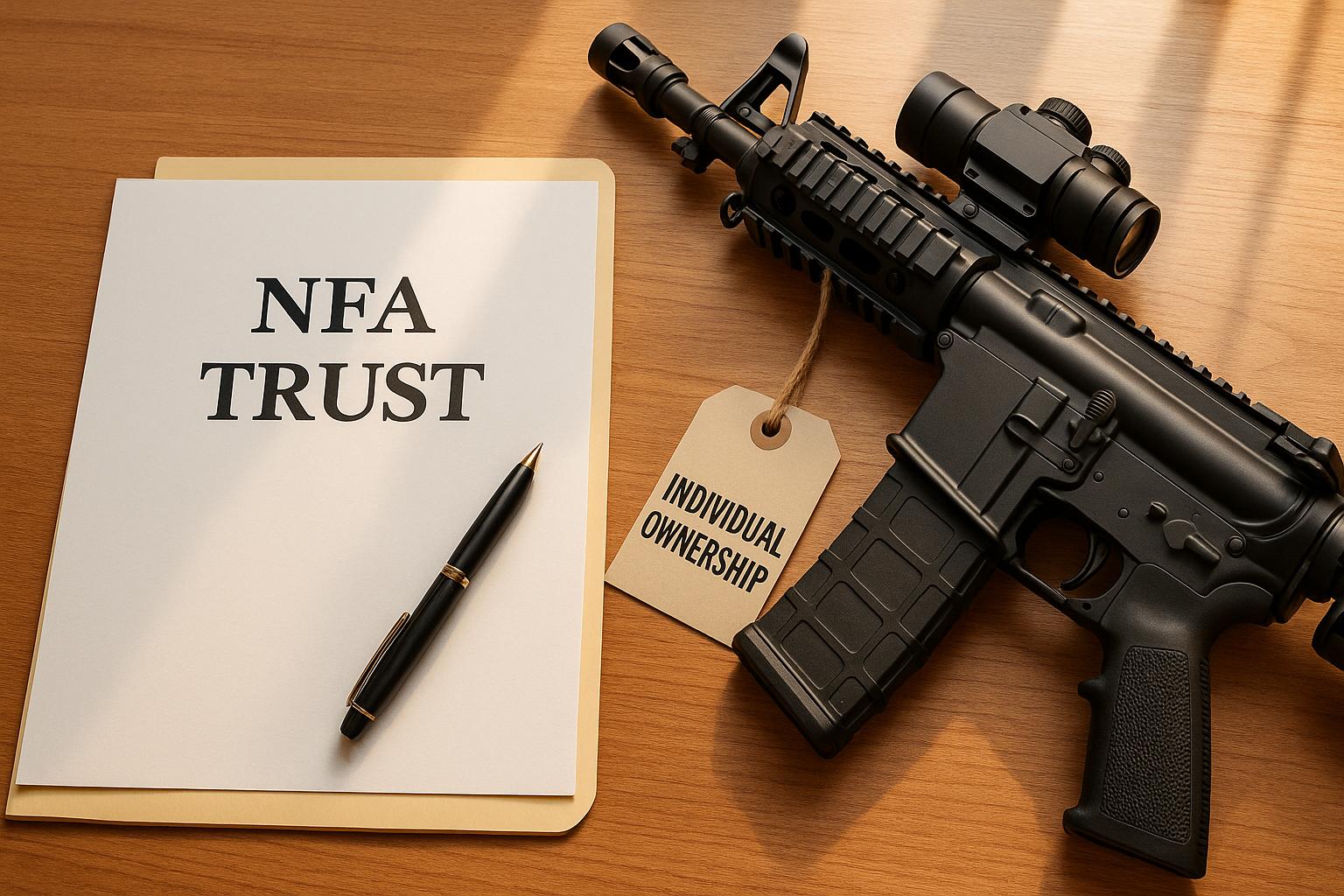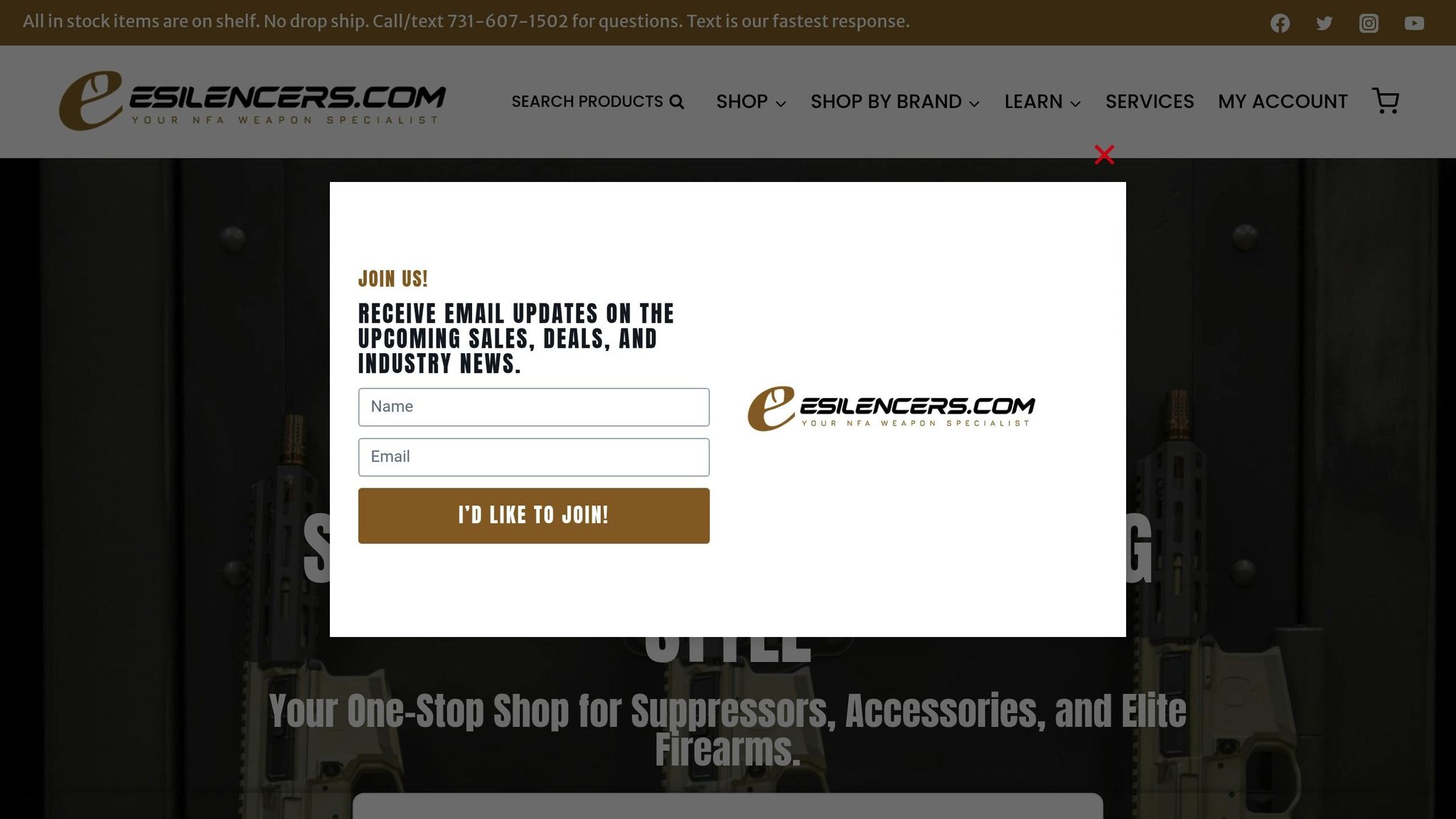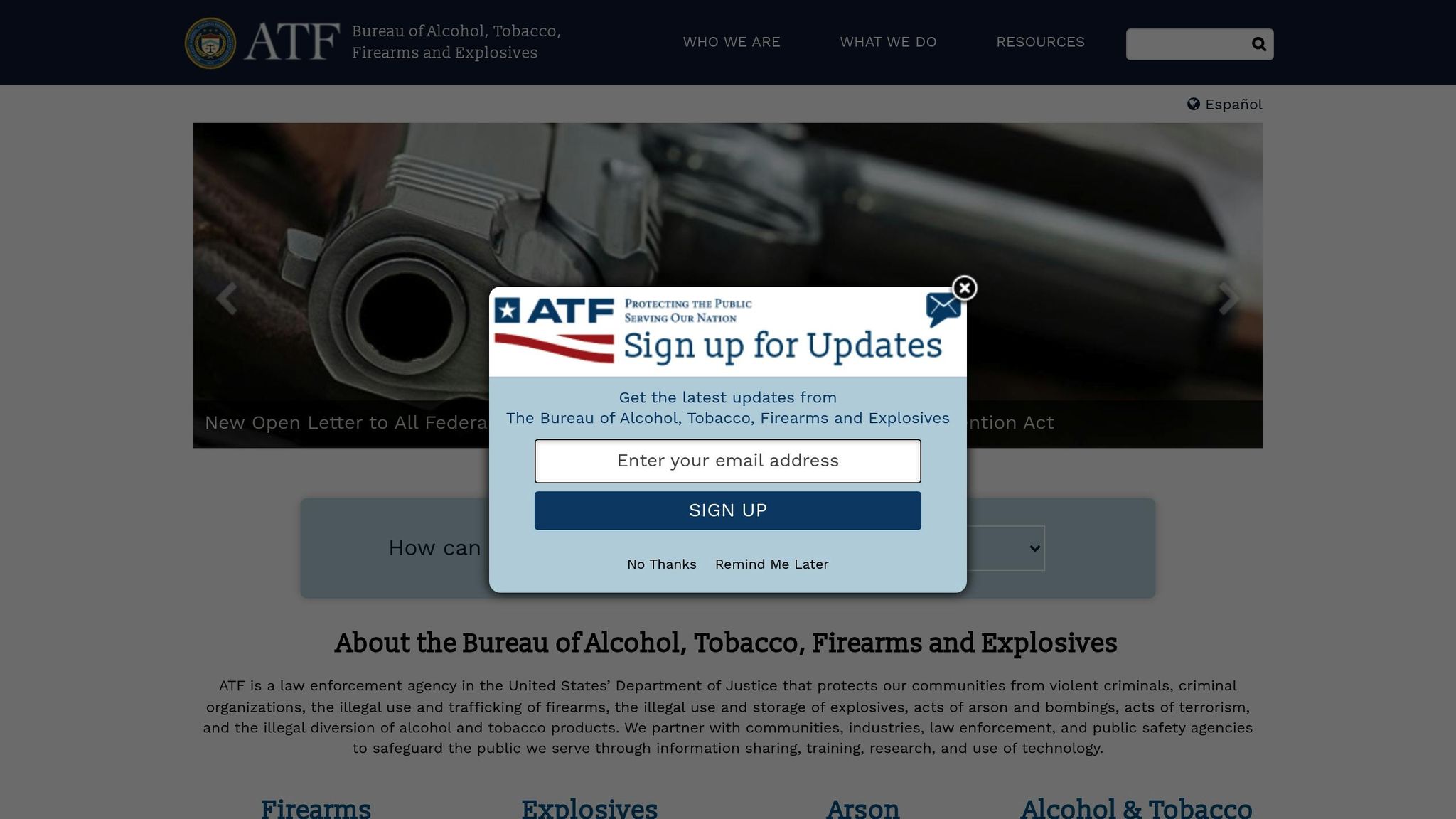NFA Trust vs Individual Ownership: Which is Better?

NFA Trust vs Individual Ownership: Which is Better?
When buying NFA-regulated items like suppressors or short-barreled rifles, you have two main options: NFA Trust or Individual Ownership. Here's how they compare:
- NFA Trust: Ideal for shared access, estate planning, and privacy. Multiple trustees can legally use the items, and ownership transfers are simpler after death. However, setup costs ($50–$300+) and longer processing times are drawbacks.
- Individual Ownership: Best for simplicity and speed. Only you can use the items, but the process is faster and cheaper upfront. Estate transfers are more complex and costly.
Quick Comparison
| Factor | NFA Trust | Individual Ownership |
|---|---|---|
| Setup Cost | $50–$300+ | $0 |
| Processing Time | Longer | Faster |
| Shared Access | Yes | No |
| Privacy | High | Low |
| Estate Planning | Avoids probate | Requires probate |
| Flexibility | High | Low |
| Complexity | High | Low |
Bottom line: Choose an NFA Trust for flexibility and shared use. Opt for Individual Ownership if you want simplicity and faster approvals.
NFA Trust vs Individual Pros and Cons | eSilencers

How NFA Trusts and Individual Ownership Differ
Choosing between an NFA Trust and individual ownership creates distinct legal frameworks for managing your NFA items. Each approach comes with its own rules for compliance, ownership, and access, which can impact how you use and pass down your firearms. Let’s break down the key differences in ownership structure, compliance requirements, and usage rights.
Legal Structure and Ownership Rights
An NFA Trust is a specialized legal entity designed to hold and manage firearms regulated under the National Firearms Act (NFA). Instead of owning the items in your name, the trust itself is the legal owner. This setup allows trustees and beneficiaries to share ownership responsibilities and rights.
With individual ownership, the items are registered solely in your name, giving you exclusive control. However, this also means that during events like death or incapacitation, transferring ownership requires formal processes, including a new $200 tax stamp and additional paperwork. In contrast, an NFA Trust simplifies inheritance and transfers, avoiding these extra steps.
Privacy is another key difference. Items held through an NFA Trust often provide more privacy since trust details are generally not part of public records. On the other hand, individual ownership links your name to all government documentation, which may make your ownership more visible.
ATF Compliance Requirements

Both options require ATF approval through Form 4, but the process differs slightly. For individual ownership, only you - the owner - must complete the background check and notify the local Chief Law Enforcement Officer (CLEO). In an NFA Trust, every trustee must go through the background check process, submit fingerprints and photographs, and notify their CLEO.
It’s worth noting that under current rules, CLEO approval is no longer required. Instead, local law enforcement is simply notified when the relevant ATF form is submitted. This change has streamlined the process but still highlights a key distinction in how compliance is handled between the two ownership types.
Who Can Use Your NFA Items
One of the most practical differences lies in who can legally possess and use your NFA items. With individual ownership, only you - the registered owner - can legally handle the items. Others, including family members, can only use them if you are physically present. For example, if a family member wants to use your suppressor, you must be there with them.
An NFA Trust, on the other hand, allows shared access. Co-trustees named in the trust can legally possess and use the items without requiring the original purchaser to be present. This makes trusts especially useful for families or groups who want shared access. However, it’s essential to carefully choose trustees who will follow all federal and state regulations.
For both ownership types, interstate travel requires additional precautions. You must ensure that your NFA items are legal in the states you visit or pass through, and in some cases, you may need government approval to transport them.
While recent ATF rule changes have standardized many aspects of the background check and fingerprinting process, the ability to share items among trust members remains a key advantage of an NFA Trust over individual ownership. This flexibility, combined with privacy benefits, often makes trusts a preferred choice for those managing multiple NFA items.
Pros and Cons of Each Option
Building on the legal differences outlined earlier, understanding the trade-offs between NFA Trusts and individual ownership can help you make the best choice for your circumstances. Each option has its own advantages and challenges, which can influence your decision based on your personal goals and priorities. Here's a closer look at the benefits and drawbacks of each.
NFA Trust Benefits and Drawbacks
NFA Trusts offer convenience and flexibility when it comes to shared access. By allowing multiple trustees to legally possess and use your NFA items, family members or trusted friends can use items like suppressors without requiring your presence. This is especially useful for practical purposes and estate planning, as the trust enables firearms to transfer directly to beneficiaries without going through probate. Additionally, the trust's name appears on ATF paperwork instead of your own, offering an added layer of privacy. If unforeseen circumstances, such as health or legal issues, arise, a named trustee can hold the items on your behalf. The ability to add or remove trustees as needed further enhances the appeal of an NFA Trust.
On the downside, setting up an NFA Trust can be more complicated and costly. Depending on whether you use a template or hire an attorney, costs can range from $50 to several hundred dollars. Attorney-drafted trusts, however, can be as affordable as $59 in some cases. Processing times may take longer because all trustees are required to complete background checks, submit fingerprints, and provide photographs. Maintaining the trust - such as updating trustee information or, in some states, registering the trust with local law enforcement - can add to the administrative workload and potentially compromise privacy. Mismanagement of the trust could also lead to legal liability for everyone involved.
Individual Ownership Benefits and Drawbacks
Individual ownership is straightforward and quick. The process is relatively simple since only you are required to complete the background check and submit the necessary documents. This often leads to faster ATF processing times. Additionally, individual ownership avoids the costs and complexities associated with setting up a trust, making it an attractive option for those acquiring a single suppressor or NFA item. You maintain full control over your items without having to deal with shared legal arrangements.
However, individual ownership has its limitations. Only you are legally allowed to use the item, meaning family members or friends cannot access it in your absence. This restriction can reduce its practical value for shared family use. Upon your death, your NFA items must go through probate, which can be both time-consuming and expensive. Transferring ownership to heirs requires a new Form 4 application, an additional $200 tax stamp per item, and months of waiting for ATF approval. Furthermore, individual ownership offers no additional privacy, as your personal name is listed on all government records.
Side-by-Side Comparison
To help you decide, here's a summary of the key differences:
| Factor | NFA Trust | Individual Ownership |
|---|---|---|
| Setup Cost | $50–$300+ | $0 |
| Processing Time | Longer (multiple checks) | Faster (single check) |
| Shared Access | Yes (trustees included) | No (owner only) |
| Privacy | High (trust name used) | Low (personal name used) |
| Estate Planning | Avoids probate | Requires probate |
| Flexibility | High (add/remove trustees) | Low (fixed ownership) |
| Complexity | High (ongoing upkeep) | Low (simple process) |
| Long-term Costs | Lower (avoids probate) | Higher (inheritance fees) |
| Legal Protection | Available (trustee holds items) | None |
These points highlight the core differences, helping you weigh which option aligns better with your needs and long-term plans.
sbb-itb-6d07923
Which Option Should You Choose?
Deciding between an NFA Trust and individual ownership depends on your specific needs, goals, and how you plan to use your NFA items. Let’s break down when each option might be the better fit for you.
When NFA Trusts Are the Better Choice
NFA Trusts shine in situations where shared access and flexibility are priorities. For instance, if you want trusted family members or friends to legally use your suppressor or other NFA items, a trust is essential. This setup is particularly useful for hunting families, competitive shooting groups, or anyone who wants their spouse or close friends to have legal access.
Another major advantage of an NFA Trust is its role in estate planning. Trusts allow NFA items to pass directly to designated beneficiaries without the delays and complications of probate. This can be a game-changer for collectors who own multiple NFA items, as individual ownership often requires additional tax stamps and legal steps to transfer items to heirs.
Privacy is another perk. With a trust, the trust’s name - not your personal name - appears on ATF records, offering an extra layer of discretion. Trusts also provide long-term flexibility, as they can be amended to add or remove trustees as family dynamics or relationships change.
When Individual Ownership Makes More Sense
If you’re the sole user of your NFA items, individual ownership may be the simpler and faster option. This path works well for those who don’t need shared access or estate planning benefits.
Individual ownership avoids the setup costs of creating a trust and involves less paperwork. Applications are typically processed faster, which is great if you’re eager to get your NFA item quickly. For those who value a straightforward and cost-effective approach, individual ownership is often the way to go.
Real-World Scenarios
Here are a few examples to help illustrate how these options work in practice:
- John, a 65-year-old hunter, is buying his first suppressor. He’s married and has two adult sons who also hunt. For John, an NFA Trust is the right choice, as it allows his family to share the suppressor legally and simplifies the process of passing it on to his heirs.
- Sarah, a 28-year-old competitive shooter, lives alone and mainly uses her suppressor at her local range. She isn’t concerned about inheritance planning and wants her suppressor as quickly and affordably as possible. Individual ownership suits her needs perfectly.
- The Miller family, who regularly hunt together on their Texas ranch, use an NFA Trust to ensure all family members can legally access their collection of suppressors and short-barreled rifles.
- Robert, a retired police officer, is looking for a single suppressor for home defense. He values a fast approval process and doesn’t need shared access. With individual applications averaging around 30 days compared to the 5–6 months typical for trust applications, individual ownership is the clear winner for him.
Ultimately, the best choice comes down to what matches your situation - whether that’s shared use, efficient estate planning, simplicity, or speed.
Making Your Decision
Choosing between an NFA Trust and individual ownership comes down to understanding your priorities and how each option aligns with your needs.
Main Points to Remember
The key distinction lies in flexibility versus simplicity. NFA Trusts allow multiple people to legally use and possess your NFA items, offering more shared access options. On the other hand, individual ownership simplifies the process with less paperwork and faster approvals.
Individual applications tend to move through the approval process more quickly than trust applications, though this comes at the cost of long-term flexibility. Trusts, while potentially more expensive to establish, offer free setup options in some cases. However, transferring items from individual ownership to a trust later will cost an additional $200 tax stamp per item.
Another critical factor is inheritance planning. NFA Trusts make it easier to transfer items to beneficiaries without extra paperwork or tax stamps. In contrast, individual ownership might require items to be surrendered temporarily to an authorized dealer or law enforcement during the transfer process.
If privacy is important to you, a trust can shield your identity by listing the trust's name instead of your own.
These considerations are essential for evaluating your priorities before making a decision.
What to Consider Before Deciding
Your choice will depend on your specific needs for shared access, estate planning, privacy, and compliance.
- Shared Access: If you want family or friends to have legal access to your NFA items, a trust is likely the better option. Individual ownership limits legal possession and use to the registered owner only.
- Estate Planning: A trust can simplify the inheritance process and ensure your items are distributed according to your wishes. This is especially valuable if you own multiple NFA items or need to account for laws restricting firearm possession in certain jurisdictions.
- Privacy: For those concerned about anonymity, an NFA Trust provides an additional layer of privacy by using the trust's name instead of your own.
- Compliance Complexity: Trusts can make compliance easier by helping maintain accurate records. However, keep in mind that ATF Rule 41F has introduced new requirements for responsible persons, including submitting forms, fingerprints, photographs, and notifying law enforcement.
- Timeline Priorities: If speed is your main concern, individual ownership’s faster approval process may outweigh the broader benefits a trust provides.
Ultimately, your decision should reflect your goals - whether that’s shared access, smoother inheritance planning, enhanced privacy, or quicker acquisition of your NFA items.
FAQs
What should I consider when deciding between an NFA Trust and individual ownership if I want to share NFA items with family?
When weighing the choice between an NFA Trust and individual ownership for sharing NFA items with family, there are a few important considerations to think about:
- Legal Access: An NFA Trust allows you to name multiple trustees, such as family members, who can legally use and possess the NFA items without needing separate registrations. In contrast, individual ownership limits access strictly to the registered owner, making it illegal for others to handle or use the items unless they go through a formal transfer process.
- Liability Concerns: If you own NFA items individually, letting someone else use or possess them could lead to serious legal trouble. An NFA Trust helps minimize this risk by ensuring that all trustees are legally authorized to access and share the items.
- Inheritance Planning: Passing on NFA items after the owner’s death can be complicated with individual ownership. An NFA Trust simplifies this process, allowing for a smoother and less time-consuming transfer of ownership to family members.
For families looking to share NFA items, an NFA Trust often offers more flexibility, legal security, and ease of planning than owning them individually.
What are the differences in transferring NFA items to heirs between an NFA Trust and individual ownership, and how can this affect costs?
Transferring NFA items to heirs depends on whether the items are owned through an NFA Trust or by an individual. Using an NFA Trust generally makes the process easier and less expensive. Beneficiaries can receive the items using a tax-free Form 5, which eliminates the $200 transfer tax per item. Additionally, the trust’s structure provides clear guidelines for inheritance, minimizing legal hurdles and ensuring a smooth transition.
On the other hand, individual ownership requires heirs to file a Form 4 and pay a $200 transfer tax for each item. Without a solid estate plan, the process can become more complicated, possibly involving probate court and extra legal expenses. For those who own multiple NFA items, an NFA Trust often provides better flexibility and helps reduce costs.
What privacy advantages does an NFA Trust provide over individual ownership, and why might this matter for firearm owners?
An NFA Trust provides a greater level of privacy compared to owning NFA firearms as an individual. With a trust, the registered owner is the trust itself, not the person, which helps keep personal details out of public records and adds a layer of anonymity.
For many firearm owners, this privacy can be crucial. It helps protect against potential social judgment, ensures personal safety, and minimizes the risk of unwanted legal attention. Unlike individual ownership, trust documents are generally not part of public records. This means they avoid the disclosures that might occur during probate or other legal processes, making an NFA Trust a smart choice for those who value discretion and security.